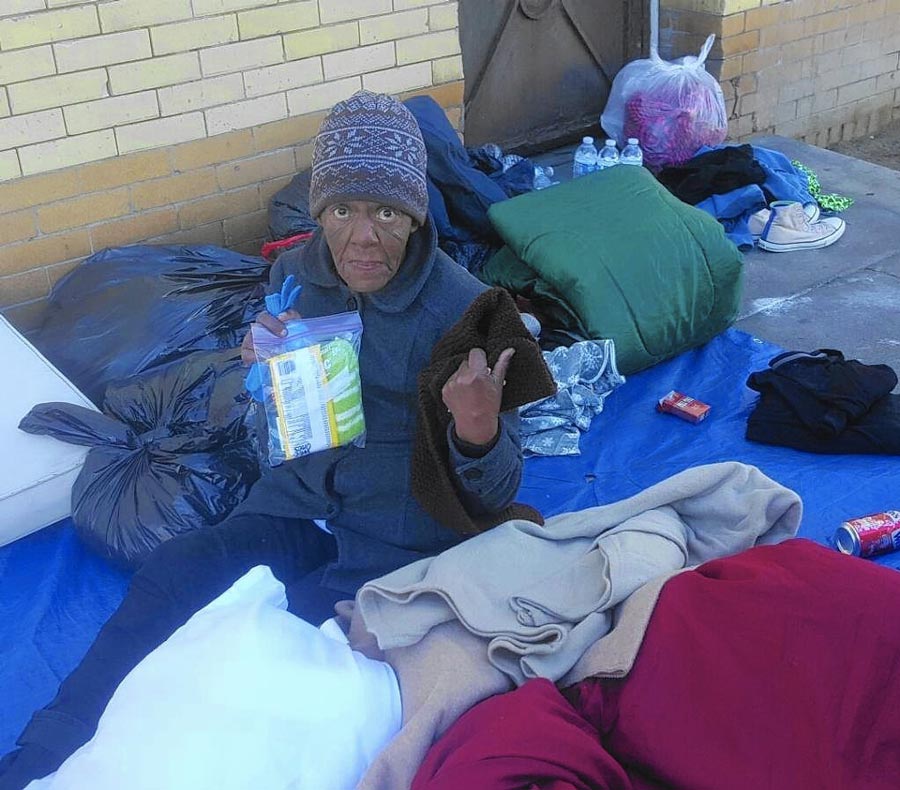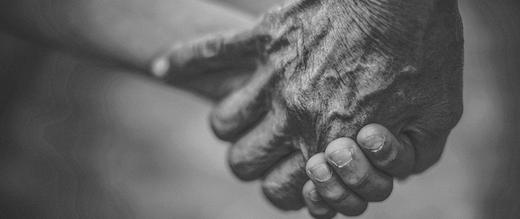The views expressed in our content reflect individual perspectives and do not represent the official views of the Baha'i Faith.
In these days the world of humanity is afflicted with a chronic disease. It is one of bloodshed, the destruction of the divine edifice, the demolition of cities and villages, the slaughter of the noble youths of the world of humanity, children becoming orphans and women homeless and shelterless. What calamity is greater than this? What crime is more heinous than this? What disease is more dangerous than this? What folly is more direful than this? – Abdu’l-Baha, Star of the West, Volume 3, p. 120.

Barbara Brown who died last week on skid row in downtown Los Angeles.
Barbara Brown died last week.
A homeless, 60-year-old African American woman who lived on the streets in downtown Los Angeles, she stayed outside on the sidewalk during a torrential El Nino rainstorm, and it killed her. They found her body wrapped up in a soggy blanket, laying on a sheet of discarded plastic on the sidewalk.
Barbara had many problems, mental illness and alcoholism among them. Social workers and the police had stopped by to see her before the storm, asking her to come in out of the rain, and offering her a warm, dry bed in a shelter. It looked like a hard rain was going to fall, they told her. But Barbara refused. After years on the streets, she didn’t trust many people. She didn’t like going to homeless shelters, where she felt cooped up and in danger. She felt safer on the street, like many mentally ill and paranoid people do, where she could get up and move if something threatened her.
So Barbara stayed where she was, and that pounding rain on cold concrete gave her hypothermia. The coroner officially said she died of “exposure.”
Yes, she did—in more ways than one. Barbara Brown died, not just from exposure to the elements, from exposure to the relentless rain, but from exposure to our broken culture, which ignores, disregards, discards and demonizes poor and homeless people. Barbara Brown died because we collectively failed to realize—and to act on the fact—that she was our sister, our mother, our daughter, our auntie, our relative and our responsibility, as a society.
Barbara had a “dual diagnosis,” as the physicians and psychiatrists usually characterize it—alcoholism and mental illness, probably schizophrenia. Both chronic diseases often lead to an inability to make sound, self-protective judgments. Homeless schizophrenics frequently have dual diagnoses, because when mentally ill people live on the streets with no access to health care services, they tend to self-medicate, with alcohol or drugs, to keep their minds dulled and dormant. With no access to or ability to afford the (relatively) sophisticated anti-psychotic pharmaceuticals now available to modern medicine, dual-diagnosis homeless people use whatever they can to moderate their disturbed and hallucinatory symptoms and allow themselves to cope with the world.
I didn’t know Barbara Brown, but I know many homeless people like her. For twenty-five years, I co-founded and served on the board of directors of a Skid Row homeless services agency that helped dual-diagnosis clients. We treated thousands of people every month, doing our best to help the huge population of Los Angeles homeless—44,000 in total, according to the last census estimate.
On the same day that Barbara Brown died, L.A. County’s Civil Grand Jury issued its report on the dire homelessness situation, saying that the largest cities within Los Angeles County have failed to provide enough shelter beds for this winter’s severe weather. The Grand Jury called the situation “unconscionable and grossly inadequate,” because shelter space exists for only a fraction of the homeless population—29,000 of whom sleep outside—to protect them from rain, cold and flooding.
The Grand Jury report says: “Not enough is being accomplished to alleviate the suffering that is certain to increase among those who lack reliable shelter as a massive El Niño weather pattern approaches. Every step should be taken to assure that unsheltered people remain dry and avoid hypothermia.”
Anyone with a conscience would probably agree with that assessment. In fact, every conscientious person might go even further, and agree that our societies should try a whole lot harder to find ways to house unsheltered and homeless people. Most of the world’s cities struggle with this issue.
What do the Baha’i teachings say about this important question? It might surprise you to know that they’re pretty clearly in favor of a home for everyone:
Baha’u’llah set forth principles of guidance and teaching for economic readjustment. Regulations were revealed by Him which ensure the welfare of the commonwealth. As the rich man enjoys his life surrounded by ease and luxuries, so the poor man must, likewise, have a home and be provided with sustenance and comforts commensurate with his needs. This readjustment of the social economy is of the greatest importance inasmuch as it ensures the stability of the world of humanity; and until it is effected, happiness and prosperity are impossible. – Abdu’l-Baha, The Promulgation of Universal Peace, pp. 181-182.
The arrangements of the circumstances of the people must be such that poverty shall disappear, and that every one as far as possible, according to his position and rank, shall be comfortable. Whilst the nobles and others in high rank are in easy circumstances, the poor also should be able to get their daily food and not be brought to the extremities of hunger. – Abdu’l-Baha, Abdu’l-Baha in London, p. 29.
How can society accomplish this laudatory but difficult goal? Urban centers in every country have adopted different approaches to deal with poor and homeless people, and yet we still have not, as a worldwide community, figured it out. The Baha’i teachings have a unique and unprecedented approach, built around a set of profound spiritual principles, which we’ll survey and summarize in this series of essays on helping the poor and homeless.
Perhaps, if enough of us understand, internalize and act on those Baha’i principles, we can save the next Barbara Brown.
Next: Everyone Has the Right to a Home
You May Also Like
Comments

















I live in San Francisco. I'm wondering, are you familiar with the Lanterman, Petris, Short Act? It is a California state law and the reason homeless/mentally ill people cannot be forced into shelter or to take their medications, etc. Below is an excerpt from Wikipedia.
"The Lanterman–Petris–Short (LPS) Act (Cal. Welf & Inst. Code, sec. 5000 et seq.) concerns the involuntary civil commitment to a mental health institution in the State of California. The act set the precedent for modern mental health commitment procedures in the United States. It was co-authored by California State ...Assemblyman Frank D. Lanterman (R) and California State Senators Nicholas C. Petris (D) and Alan Short (D), and signed into law in 1967 by Governor Ronald Reagan. The Act went into full effect on July 1, 1972. It cited seven articles of intent:
To end the inappropriate, indefinite, and involuntary commitment of mentally disordered persons, people with developmental disabilities, and persons impaired by chronic alcoholism, and to eliminate legal disabilities;
To provide prompt evaluation and treatment of persons with serious mental disorders or impaired by chronic alcoholism;
To guarantee and protect public safety;
To safeguard individual rights through judicial review;
To provide individualized treatment, supervision, and placement services by a conservatorship program for gravely disabled persons;
To encourage the full use of all existing agencies, professional personnel and public funds to accomplish these objectives and to prevent duplication of services and unnecessary expenditures;
To protect mentally disordered persons and developmentally disabled persons from criminal acts.
The Act in effect ended all hospital commitments by the judiciary system, except in the case of criminal sentencing, e.g., convicted sexual offenders, and those who were "gravely disabled", defined as unable to obtain food, clothing, or housing [Conservatorship of Susan T., 8 Cal. 4th 1005 (1994)]. It did not, however, impede the right of voluntary commitments. It expanded the evaluative power of psychiatrists and created provisions and criteria for holds."
Living in SF proper many of us complain about the homeless problem but know nothing of how we got into this situation.